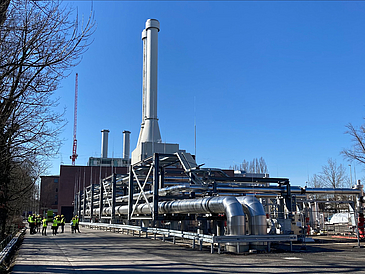The Institute of Automation Technology (IAT) at the University of Bremen has launched a research project on the efficiency of energy grids together with three partners. The "En-eff_Netzregelung" project, which is supported by the Federal Ministry for Economic Affairs and Climate Protection, aims to develop a basis for optimizing the operation of district heating and cooling networks in terms of energy efficiency and service life. The future regenerative and more decentralized generation structure, lower flow temperatures, and an increasing expansion of network sensor technology through smart metering will be taken into account.
The project initially involves researching and modeling energy losses. To check this, sensors at selected points in Stadtwerke München's district heating network will record the temperature and humidity in the ground. In addition, aging effects of the infrastructure will be researched, modeled, and verified using the collected data.
The results will be integrated into an already existing network simulation model. This network model will then be used to develop a procedure for network regulation that takes all effects into account and regulates the network accordingly. In the medium term, the overall procedure developed in this way is to be implemented in Munich's district heating networks.
The aim is to develop software that can control and regulate a district heating network fully automatically and optimally in terms of service life and energy use, while being able to cope with all conceivable operating situations. Initially, however, this software should not automatically implement regulations, but rather support the operating personnel with suggestions for optimal operation.
The results are of great interest to Stadtwerke München, particularly with regard to ideal energy utilization in Munich's district heating and cooling network, which is increasingly supplied by geothermal energy, in combination with new applications for digital technologies in the infrastructure. Put simply, even more efficient network operation could supply more households with the same amount of energy.
On the research front, the partners are the Institute of Automation Technology (IAT) at the University of Bremen and the Technical Infrastructure Management department at HafenCity University (HCU) in Hamburg. IAT is responsible for the further development of the existing grid simulation model and the development of optimal control algorithms. HCU is developing calculation algorithms for estimating the energy efficiency and service life of the lines. Stadtwerke München (SWM) is involved as the operator of several district heating networks in Munich, supplier of measurement data, and user of the results. The district heating association AGFW completes the consortium and ensures the migration of the "En-Eff_Netzregelung" project's research findings into the industry.
Contact:
Prof. Dr. Kai Michels
University of Bremen
Faculty 01: Physics / Electrical Engineering
Institute of Automation Technology
Phone: + 49 421 218-62500
Email: michelsprotect me ?!iat.uni-bremenprotect me ?!.de

